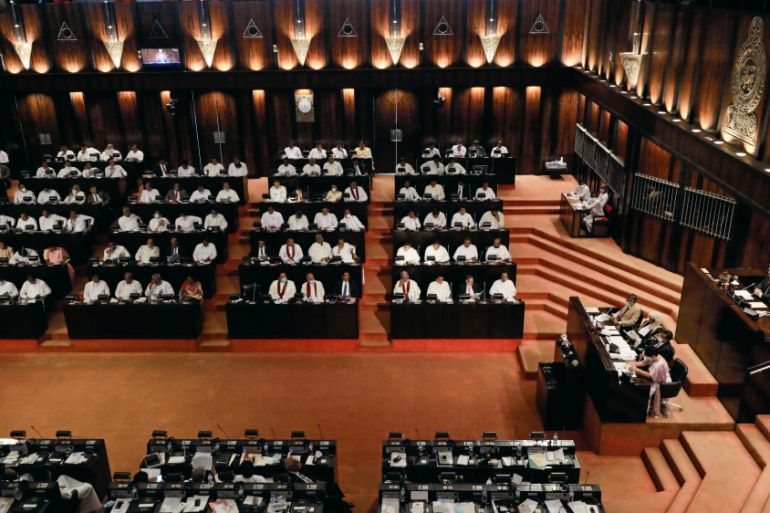Sri Lanka: Bill granting more powers to president tabled
The bill would give president Gotabaya Rajapaksa sweeping powers but opposition fears it could be misused.

Sri Lanka’s right-wing government has presented a draft amendment to the constitution which would give extra powers to President Gotabaya Rajapaksa, while the opposition has denounced the move.
If passed, the Draft Bill of the 20th Amendment to the Constitution would allow President Gotabaya to dissolve the parliament and would give him full immunity against any prosecution. It would take two weeks to be passed in parliament.
The bill is set to replace the 19th amendment, passed in 2015, which strengthened the role of the parliament and curtailed the powers of the country’s president.
Reporting from Colombo, Al Jazeera’s correspondent Minelle Fernandez said the bill had “drawn mixed reactions”.
“When the Justice Minister Ali Sabry tabled that draft, he did to howls of protests by the opposition,” she said.
Scenes of shouting and opposition members – who fear that such a law could be misused by the president – holding placards and wearing black bands denouncing the move were posted online.
“With these changes, the president can essentially run the whole show himself. The Prime Minister [Mahinda Rajapaksa] and the cabinet become bystanders,” Fernandez added.
Last month in a policy speech, Gotabaya said he would use the overwhelming mandate received by his governing coalition in recent parliamentary elections to abolish the 19th amendment as a matter of priority and then work on a new constitution.
|
|
The raison d’etre of the 19th amendment, which was put in place under Gotabaya’s predecessor Maithripala Sirisena, was reducing the ability of presidents to amass extensive powers.
The 20th amendment will return Sri Lanka to its previous constitutional status, in which the president could head ministries, appoint and dismiss ministers, appoint officials to the police, the heads of the armed forces, judiciary and public service and dissolve parliament any time after one year.
Al Jazeera’s Fernandez said while there were demonstrations in the parliament, the government nonetheless had a “massive majority”.
“It’s almost an approval at this point for the amendment and the proposed changes it will bring, it is only a matter of time,” she added.
In the August 5 parliamentary elections, Rajapaksa’s Sri Lanka’s People’s Front won 145 seats and secured the support of six allies, one seat more than the minimum number needed to change the constitution in the 225-seat legislature.